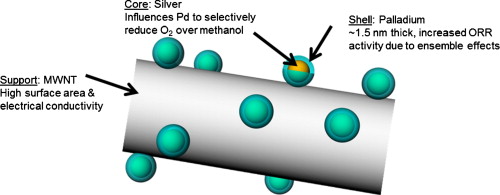
Fuel cells are a promising technology to help meet the increasing demand for power in a wide range of applications – automobiles, spacecraft, submarines, portable electronics, stationary power systems, etc. Fuel cells are versatile, more efficient than internal combustion engines, and provide continuous power (as opposed to a rechargeable battery). Micro fuel cells, in particular, offer an alternative to batteries in portable electronic devices, including cell phones and laptop computers. Their small size, increased energy density, and ability to produce electricity without the need to recharge make micro fuel cells an attractive area of study.
Our research focuses on improving micro fuel cell performance by addressing the key challenges: catalyst utilization, miniaturization, and the cost of design and manufacturing processes. We have developed a novel micro fuel cell using bulk metallic glass (BMG) materials in the catalytic and gas diffusion layers. Our group has previously shown that Pt-rich BMGs offer outstanding electrochemical performance, together with the ability to form fully amorphous, durable, and easily micro-fabricated materials. Ongoing work includes testing various catalyst architectures to achieve superior Pt utilization.
Our research focuses on improving micro fuel cell performance by addressing the key challenges: catalyst utilization, miniaturization, and the cost of design and manufacturing processes. We have developed a novel micro fuel cell using bulk metallic glass (BMG) materials in the catalytic and gas diffusion layers. Our group has previously shown that Pt-rich BMGs offer outstanding electrochemical performance, together with the ability to form fully amorphous, durable, and easily micro-fabricated materials. Ongoing work includes testing various catalyst architectures to achieve superior Pt utilization.
